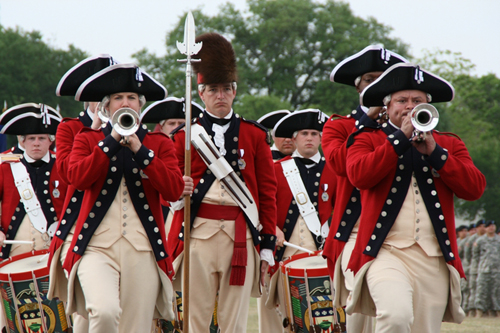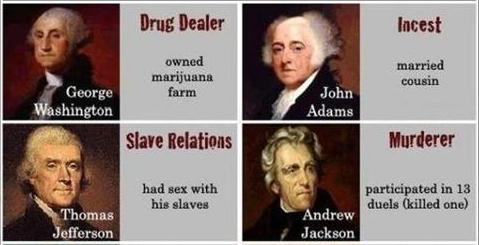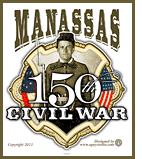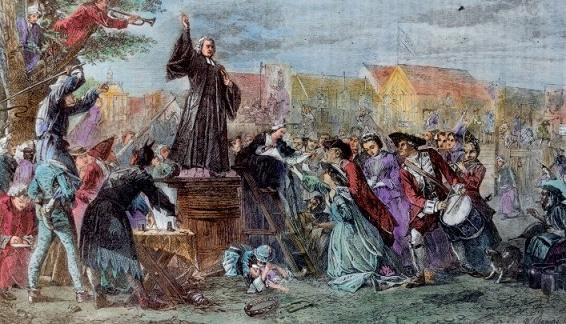
Updated: Sunday, 10 April 2011 12:32 AM EDT
Permalink | Share This Post







Today I want to address my last post and the discussions I have been having that forced me to think long and hard about the concept of heroes and historical memory. Richard Williams and I have been debating the issue and he will be posting his own thoughts over on the Old Virginia Blog in the coming day(s).
The best way that I can explain my take is to correlate it to the modern world of sports. When we are kids, we look up to our athletes and try to emulate them on the field. We hang their posters on our wall, wear their jerseys, and collect their memorabilia. Then we grow up. As we mature, we realize that these guys were just athletes. Sometimes they turn out to be jerks, or steroid users, or not half as good as we remember them. More often than not they don’t live up to our expectations. As adults, we no longer place these "superstars" on pedestals. We still love sports and we may fondly recall our favorite players from our childhood. The difference is that we no longer look at them as heroes. We look at them as people. That epiphany is exactly what many historians experience.
If you think about it, the sports example is actually better because those are people we have first-hand knowledge of. The only thing we know about these 18th and 19th century historical figures (at a personal level) is what they and/or others tell us. None of our interpretations can be based on our own experience. Therefore it’s even stranger to have a historical figure be a ‘hero’ because we can only base our impressions on what we ‘think’ is the truth. We don't know these people. I never met George Washington or Stonewall Jackson, so what am I basing my affections for them on? It’s based entirely on what they and/or others have presented to me. Now let’s ask ourselves whose version of history is more credible: The historian who considered their subject to be a hero and allowed it to shape their interpretations, or the historian who does not have a personal bias and simply presented the facts that their research revealed to them?
Over the last few years I feel as if I've matured from the first example to the latter. I still find these folks equally fascinating. I just look at them differently. This week I have been watching Ken Burn’s "The Civil War" on PBS. This is hands down, the best documentary series ever made. Burns' genius is in his presentation: the combination of photos, the reading of letters, thoughtful commentary, and a fact-driven narrative. At no time does he dramatize, inflate, or manipulate the history. He doesn’t depict Grant, or Lee, or Lincoln in their usual "mythical" way. He simply presents their images and words, as they were, allowing the audience to make their own interpretations.
Image source: XORIENTE
NEXT POST (maybe): Barring a Government shutdown (which looks more and more likely as I type this), I will be making a trip up the road to the National Mall to photograph the presidential monuments. My plan is to blog a little about their history, but more importantly how they are interpreted today. Of course the Washington and Jefferson monuments will be the focus of the piece. IF this weekend is shot to hell by the politicians, I, along with 800,000 other Americans will be on an involuntary furlough. You can expect plenty of posts then as I’ll have buckets of free time.


The hardest part of being a historian is accepting the fact that you may not like the answers you find.
I like to think that I’ve evolved into a more objective historian over the last few years. Ever since “Blog, or Die.” debuted back in 2009, I have become increasingly critical when analyzing the lives of our forefathers. As a result, my blog has become more popular and respected at a professional level. This has led to bigger gigs and better books. In many of my previous works (2000-2009), especially those written for the religious genre, I intentionally focused on the positive aspects of history believing it could be both educational and inspirational. I always believed that history was among our most cherished treasures, but learning about it meant nothing if we couldn’t apply it to our lives in some tangible, positive manner.
I still believe that. However, what I am learning nowadays is that “applying history to our lives in some tangible, positive manner” doesn’t always translate into a ‘DO.’ Many times it translates into a ‘DON’T’. In other words, there are many times when we should not admire or emulate these men. Far too often people try to separate the good from the bad when discussing our nation’s legacy. We don’t want to acknowledge that George Washington was a slaveholder, or that Mickey Mantle was a womanizing alcoholic. We only want to remember George’s honesty and Mickey’s homeruns.
Unfortunately looking through rose-colored glasses is NOT the way to preserve and present proper history. We must come to terms with the fact that many of our icons, like a Washington, Jefferson, Jackson or Lee, viewed women as inferior and African-Americans as property. We must accept the reality that they were often erroneous in their beliefs and conduct.
I used to get angry at other historians who were considered by many to be ‘naysayers’ or ‘overly-negative’ in their work. I now understand exactly where they are coming from. Historical figures have always been presented to us on a pedestal. For us to simply ignore their wrongs in favor of their rights does a great disservice to their memory. Worse off, we are being dishonest to ourselves and our readers when we only present the histories that we are comfortable with.
Admittedly, I was once guilty of this myself. When the vast majority of my work moved over into the secular realm, I immediately became conscious of my own preconceived notions. It was difficult at first, but I had to accept the darker sides of my idols. I also had to accept that they weren’t necessarily idols. I had to look at them honestly as men who could be both applauded and lauded. Only then did I truly see them.
That is what separates a historian from a history enthusiast. Removing our own personal attachment is the challenge. We become historians because we grow up loving history. We are star-struck by the men and women and events that we learned about. As we mature, we realize that there is usually more to the story. As historians, it’s that ‘more’ we should labor to find. After all, that's part of the story too.
Image source: PunditKitchen
ADDED 4/7: Yesterday’s post generated some interesting conversations between a few historian friends and me. The general consensus was that we can acknowledge historical figure’s flaws and weaknesses while honoring their accomplishments, character qualities, and positive contributions to our nation's history. At the same time we must be conscious not to allow our own personal biases influence how we analyze them. That’s a given. We also agreed that selective memory or hero worship distorts scholarship and inflates historical figures to mythical-like proportions. The reality is that most of our so-called “heroes” would never live up to our expectations. The strangest part of it all is that we will never meet any of these people, yet we often feel some kind of personal connection to them. So here you have the dilemma of the impersonal becoming personal. Finally we acknowledged that what may have been acceptable then may not be acceptable now and therefore we must keep things in context. I have a friend in the National Park Service who is considered a leading authority and penned one of the most critically-acclaimed Civil War books ever published. He once told me that he had absolutely no historical heroes and that he looked at people simply as they were. That puzzled me at the time, but now I get it.

 As April is the official kick-off of the Civil War Sesquicentennial I would be remiss if I didn’t take this opportunity to do some shameless self-promotion. On April 30th I will be presenting a lecture on the gallant boys of the 123rd Pennsylvania Volunteers and hosting a screening of “The Angel of Marye’s Heights” (*both events twice) at the CarnegieCarnegie’s annual Civil War Weekend (See schedule). On May 15th I will be hosting another screening of “The Angel...” and providing producer comments at Manassas Museum (Details here). I am also pleased to share that my book The Civil War in Spotsylvania County (VA): Confederate Campfires at the Crossroads has been selected as the book of the month on the Rappahannock Regional Library’s Sesquicentennial website. (For all of my Civil War books, please visit Amazon.com.) Finally, I am very happy to announce that I will be returning to the Gathering of Eagles at historic Winchester Courthouse on June 4th, where I will be selling/signing books and DVDs in the author’s area.
As April is the official kick-off of the Civil War Sesquicentennial I would be remiss if I didn’t take this opportunity to do some shameless self-promotion. On April 30th I will be presenting a lecture on the gallant boys of the 123rd Pennsylvania Volunteers and hosting a screening of “The Angel of Marye’s Heights” (*both events twice) at the CarnegieCarnegie’s annual Civil War Weekend (See schedule). On May 15th I will be hosting another screening of “The Angel...” and providing producer comments at Manassas Museum (Details here). I am also pleased to share that my book The Civil War in Spotsylvania County (VA): Confederate Campfires at the Crossroads has been selected as the book of the month on the Rappahannock Regional Library’s Sesquicentennial website. (For all of my Civil War books, please visit Amazon.com.) Finally, I am very happy to announce that I will be returning to the Gathering of Eagles at historic Winchester Courthouse on June 4th, where I will be selling/signing books and DVDs in the author’s area.


Often referred to as the most venerated preacher of the 18th-century, Reverend George Whitefield helped spread the “Great Awakening” in both Britain and the North American colonies. As an Anglican Protestant minister, he is also credited with founding the evangelical movement that would lead to the establishment of Methodism. Rev. Whitefield’s reputation as a fiery preacher drew great crowds throughout the colonies to include both non-believers and devout followers. The largest churches in these towns could not hold the 8,000+ citizens who came to see him, so Whitefield began delivering his sermons outdoors in order to accommodate the masses. Sometimes the audience would swell to outnumber the town’s population. As a result Whitefield became one of the most widely recognized public figures in colonial America.
Coming from a poor background, Whitefield managed to get free tuition from Oxford University by acting as a servant for a number of high-ranked upperclassmen. While there he joined an organization known as the “Holy Club” along with the brothers John and Charles Wesley. It was during this time that he became fervently religious and began preaching incessantly about his new-found faith. Impressed with Whitefield’s passion for prayer, the Bishop of Gloucester recruited and ordained him before the canonical age. After preaching in his home of Gloucester, Whitefield departed for the colonies where he was made the parish priest of the church in Savannah Georgia. After a one-year stay, he returned home in order to resume his evangelistic activities. Whitefield openly accepted the Church of England’s official doctrine supporting predestination, but disagreed with their views on slavery. As a result, he left the mainstream movement to form the first Methodist Conference where he served as president before turning the position over in favor of his evangelical work.
As a testament to Whitefield’s skills as an orator, Benjamin Franklin once attended a revival meeting in Philadelphia and was greatly impressed with the reverend’s ability to deliver his message to such a large crowd. Surprised by the mass of humanity surrounding the speaker, Franklin no longer assumed the reports of Whitefield preaching to thousands in England to be greatly exaggerated. Despite his own lack of religious practice, Franklin came to greatly admire Whitefield both for his passion for the Gospel, as well as his ability to reach people of all faiths and denominations. He later recalled that the revival was, “wonderful...change soon made in the manners of our inhabitants. From being thoughtless or indifferent about religion, it seem'd as if all the world were growing religious, so that one could not walk thro' the town in an evening without hearing psalms sung in different families of every street.”Revered by many, Whitefield defined a unique style of preaching that would elicit emotional responses from the audience. He also granted permission for the publishing of his sermons igniting criticisms accusing him of being over-exuberant in his language. These censures had little effect on the shepherd or his flock. Perhaps his most controversial stance was that slavery had been ordained by God. In 1749, Whitefield campaigned for the legislation of slavery, which was outlawed in 18th-century Georgia. His argument was that no territory could prosper or grow without the support of slave labor. In 1751 he returned to America for a fourth time, viewing the re-legalization of slavery in Georgia as necessary to make agriculture profitable. Whitefield proceeded to purchase slaves himself to work at the Bethesda Orphanage and at Providence Plantation. In an open-letter to his friend Benjamin Franklin, Whitefield presented his conflicting thoughts on those held in bondage. He wrote:
I must inform you in the meekness and gentleness of Christ, that God has a quarrel with you for your cruelty to the poor negroes. Whether it be lawful for Christians to buy slaves, I shall not take it upon me to determine, but sure I am that it is sinful…to use them worse than brutes. …,Although I pray God the slaves would not be permitted to get the upper hand [ie, in revolution against the white slave owners], yet should such a thing be permitted by [God], all good men must acknowledge, the judgement would be just.Whitefield is also credited with being one of the first white preachers to introduce Christianity to African-Americans. He was said to have treated his slaves well (under the circumstances) and upon his death, he bequeathed them to the Countess of Huntingdon.
AUTHOR’S NOTE: I found the lack of attention paid to Whitefield’s practice as a slaveholder to be very interesting. Several of the more notable Christian-based publications including Christianity Today and the Christian Classics Ethereal Library either briefly mentioned or completely ignored this fact. It pains me to say anything positive about Glenn Beck, but this is one instance when I found his take to be historically accurate. During his May 14, 2010 broadcast Beck introduced the Reverend George Whitefield to his audience:
I think George Whitefield is a man for today. He's complicated and controversial. We'll get to his views on slavery, which were bizarre, but a man of his time, I guess. He was a man who was years before the revolution, was teaching colonists they could have a relationship with God, they could stand up to authority, he's the man that laid the groundwork for the revolution. He was also strangely for slavery, but when he got to Maryland, when he made his first trek to Georgia from New York, he's coming down through Maryland and he first sees plantations and he is horrified at slavery. He is for slavery, but horrified because he thinks they're being treated terribly, he said you be kind to slaves, they have souls. He didn't make that final leap. I found it so bizarre that he was for slavery, but couldn't get his arms around the way you were treating them, like there is a good way to treat your slave.This contradiction comes up again and again when examining the Founding Fathers: the idea that by treating one’s slaves in a more humane manner, they lessen their sins as slaveholders. Whitefield is a special case as not only did he practice the institution himself, he also campaigned for it. So here we have a man who is celebrated to this very day for his piousness, venerated with a feast day on the liturgical calendar of the Episcopal Church on November 15, yet guilty of helping to reinstate slavery in 1751 Georgia. Whitefield’s legacy is a perfect illustration of the complexity that exists in the lives of influential whites in colonial America and how we sometimes struggle to remember them today.
